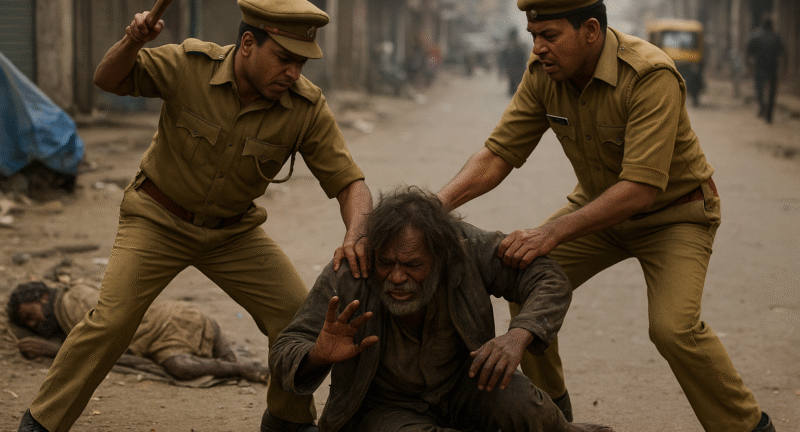
The Supreme Court’s ‘Parasites’ Remark for Homeless Is an Injustice Beyond Measure
A Statement That Shames the Nation
In a recent hearing regarding night shelters, the Supreme Court of India made a statement that has left many shocked and outraged. The court, while discussing the government’s responsibility toward the homeless, remarked that providing them with freebies turns them into ‘parasites.’ This statement, brutal and dehumanizing, reflects an insensitivity that is intolerable in a country where millions struggle daily to survive.
The idea that free food and night shelters make the homeless dependent is not just misguided but deeply detached from reality. The Supreme Court, the very institution meant to uphold justice and protect the vulnerable, has instead chosen to shame them. The remark raises serious concerns about how the judiciary perceives economically marginalized populations and whether it truly understands the depth of their struggles.
The Harsh Reality of Homeless Shelters: Alienation and Mental Health Struggles
Having worked in a homeless shelter, I can attest that the experience is shattering. The people living there are not ‘parasites’; they are victims of a system that has failed them at every turn. There exists a deep alienation within these shelters—a sense of being abandoned by society, of being reduced to mere numbers rather than human beings with dignity and aspirations.
The psychological toll of homelessness is immense. Many individuals suffer from severe depression, anxiety, and trauma due to years of neglect and hardship. A life of uncertainty, hunger, and rejection from mainstream society often leads to deteriorating mental health. Rather than acknowledging this reality, the Supreme Court’s statement further stigmatizes an already vulnerable population, reinforcing the idea that they are undeserving of compassion or support.
Many individuals I met were desperate to earn money, not because they were unwilling to work, but because work was scarce and exploitative. Some were even willing to sell their kidneys just to get by. Others took on any labor work they could find, despite being paid minimal wages. The Supreme Court’s claim that freebies prevent these individuals from working ignores this harsh reality. It paints them as lazy and unmotivated when, in truth, they are among the hardest-working people in our society, struggling to survive under unimaginable conditions.
A Flawed Understanding of Poverty
The Supreme Court’s statement echoes a common belief among many privileged individuals—that giving money or food to the poor makes them dependent. I have heard countless laypeople say, “Don’t give them money; they will just spend it on alcohol.” Now, the highest court in the country is making a similar argument, only magnified in its cruelty by referring to these people as ‘parasites.’
This flawed perspective fails to recognize that the homeless are not in their situation by choice. They are victims of systemic inequalities, economic downturns, and policy failures. Instead of questioning why people need these ‘freebies’ in the first place, the court has chosen to degrade them, shifting the blame onto the poor rather than addressing the structural issues that perpetuate homelessness.
Selective Outrage: Why Are Industrialists Not Called ‘Parasites’?
While the Supreme Court condemns the homeless for relying on minimal government assistance, it remains silent when it comes to wealthy industrialists and capitalists who have exploited public resources and evaded accountability. Industrialists are granted debt waivers worth thousands of crores. Business tycoons flee the country after taking massive loans from Indian banks, and yet, no one dares to call them ‘parasites.’ Instead, they are celebrated as entrepreneurs, even as they drain national resources and leave taxpayers to bear the burden of their unpaid debts.
Government policies often favor the wealthy, offering tax cuts, land grants, and financial incentives under the guise of ‘economic growth.’ These same industrialists lobby for policies that suppress workers’ rights, keeping wages low while accumulating enormous wealth. Meanwhile, the homeless—who receive nothing more than the bare minimum for survival—are vilified for supposedly draining national resources.
But when a destitute person eats low-quality food at a night shelter—food that no one would consume willingly—they are suddenly labeled a parasite? This hypocrisy is disgraceful.
The Absurdity of the ‘Mainstreaming’ Argument
The Supreme Court’s argument that homeless individuals should be brought into the mainstream of society is, on the surface, correct. But what is the proposed road map for achieving this? Is the court suggesting that taking away free food will miraculously integrate them into the workforce? If so, this is not just naïve but deeply irresponsible.
These individuals already work—most of them as daily wage laborers, earning meager amounts that barely sustain them. Some days they find work; other days they don’t. Many send whatever little they earn to their families. The court suggests that the government should focus on giving them jobs, but is this a joke? The government has failed to provide employment even to educated university graduates. How, then, can we expect it to suddenly provide stable jobs to the homeless?
Ignoring the Systemic Causes of Homelessness
No government, regardless of its political affiliation, truly cares about the homeless. They exist in the blind spots of society, ignored until election time when politicians suddenly remember them as potential voters. Instead of addressing the root causes of homelessness—lack of affordable housing, inadequate wages, and insufficient social security—governments offer temporary relief in the form of night shelters and food programs. And even these minimal services are now being condemned as ‘freebies.’
It is not the homeless who are parasites; it is the system that has parasitically fed on their labor while offering nothing in return. The real question should not be whether these individuals deserve free food but why they need it in the first place.
What Can the Supreme Court Do?
Rather than shaming the homeless, the Supreme Court should use its power to force the government to take real action.
- Can the court demand an increase in funding for organizations that provide shelter and rehabilitation?
- Can it push for stronger labor protections to ensure fair wages for daily workers?
- Can it call for an investigation into why government schemes meant for the poor are often riddled with corruption and inefficiency?
- Can it demand that tax benefits and debt waivers for industrialists be scrutinized with the same intensity as welfare programs for the poor?
The judiciary has immense power to influence policy and hold the government accountable. But instead of advocating for real change, it has chosen to degrade the most vulnerable members of our society.
A Call for Dignity and Justice
The Supreme Court’s statement is not just an insult; it is a reflection of a broader societal indifference toward the poor. Homelessness is not a moral failing or a sign of laziness—it is a crisis born out of economic inequality and systemic neglect. Instead of shaming those who are already suffering, we must work toward restoring their dignity and providing them with real opportunities to rebuild their lives.
Justice is not just about punishing criminals; it is also about protecting the marginalized. If the Supreme Court cannot recognize this fundamental truth, then what hope do we have for a just and equitable society?
Related Posts
Behind the Curtain: Policing, Authority, and the Erasure of Homeless Lives in Delhi
Every day on my way to work at a homeless recovery shelter in Delhi, I walk past...
Why Do We Compare Ourselves to Others? A Relational Perspective
Comparison is an almost universal experience. Whether scrolling through social...


